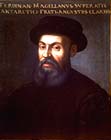Famous Navigators
A tribute to the great Portuguese navigators
Ferdinand Magellan
Ferdinand Magellan had studied enough Charts and stories to know that other explorers had probed the South American coast, and that he was sure there existed an opening through the land mass that stretched from the North Pole south to the vast ocean Balboa saw at Panama in 1513. He did not believe that the land mass stretched all the way to the South Pole. His ambition was to reach the Spice Islands by sailing west from Europe, an idea proposed by Christopher Columbus a few years earlier. Spurned by the king of Portugal, Magellan proposed his idea to the Spanish Monarch, Charles V, who approved the voyage.
In September 1519, Ferdinand Magellan set sail from Spain with a fleet of five ships and a crew of 280 men. Like Columbus, Magellan was a foreigner in command of a Spanish fleet. They headed Southwest towards Brazil and then sailed further south. Finally in October 1520, the fleet reached Cape Virgenes and with it, the entrance to the long-sought straits. Those straits, which are 373 miles long, now bear the name of the daring discoverer. After sailing for three weeks the fleet reached the Pacific Ocean. After reaching the Pacific, many wanted to turn back and not face the vast expanse of water to the west. Magellan insisted and for 96 days, they sailed with the trade winds on a greater stretch of water without land that they had ever encountered in any part of the world.
In March 1521, Magellan discovered the Archipelago of SanLazaro, (later called the Philippines), where he was received in a friendly manner by the island chief. In April 1521, Magellan was killed in a battle with the natives in an attempt to convert the chief of the neighboring island, Mactan, to Christianity. The expedition was then taken over by Sebastian del Cano who managed to sail back to Spain. Only one ship and eighteen men returned to Spain in September 1522, after circumnavigation of the world!

Circumnavigation of the world.
Though Magellan himself did not reach his goal, the Spice Islands; yet he had accomplished the most difficult part of his task. He had been the first to undertake the circumnavigation of the world, had carried out his project completely, and had thus achieved the most difficult nautical feat of all the centuries! The voyage proved most fruitful for science. It gave the first positive proof of the Earth's rotundity and the first true idea of the distribution of land and water.